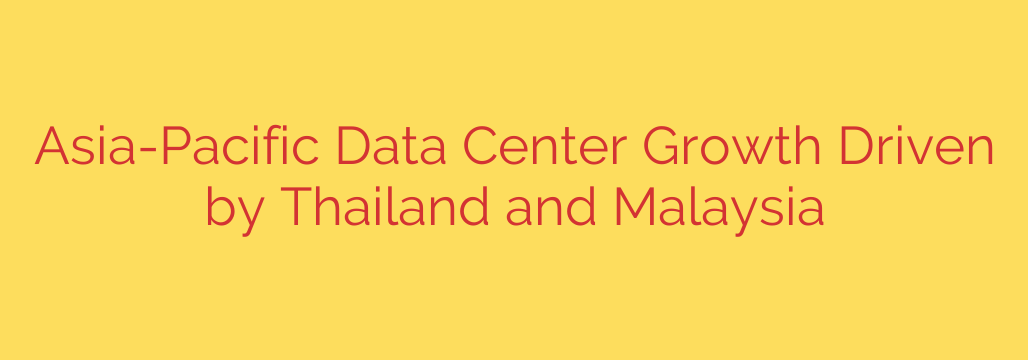
Beyond Singapore: Why Thailand and Malaysia Are the New Hotspots for Data Center Growth
In the relentless expansion of the digital economy, the demand for robust, scalable, and efficient data centers has never been higher. For years, the Asia-Pacific (APAC) market was dominated by established hubs like Singapore, Hong Kong, and Tokyo. However, a significant shift is underway. As businesses seek new strategic locations, Thailand and Malaysia are rapidly emerging as the new powerhouses, attracting massive investments and reshaping the region’s digital infrastructure landscape.
This evolution isn’t just about adding more servers; it’s a strategic realignment driven by government support, economic advantages, and the ever-growing need for localized data processing to power everything from cloud computing to artificial intelligence.
The Shifting Landscape of APAC’s Digital Infrastructure
For decades, Singapore served as the premier data center hub for Southeast Asia, offering unparalleled connectivity and a stable business environment. However, land scarcity and power grid limitations led to a moratorium on new data center development, which, although recently lifted, has prompted global companies to look for viable alternatives.
This created a golden opportunity for neighboring countries to step up. Both Thailand and Malaysia have capitalized on this moment, positioning themselves as attractive, growth-oriented markets ready to support the next wave of digital transformation.
Why Malaysia is a Prime Destination for Data Centers
Malaysia has strategically positioned itself as a leading destination for hyperscale and colocation data centers through a combination of proactive government policies and natural advantages.
- Strong Government Support: The Malaysian government has been instrumental in this growth. Initiatives under the Malaysia Digital Economy Blueprint (MyDIGITAL) have created a favorable environment for investment, offering tax incentives and streamlined processes for data center developers.
- Strategic Location and Connectivity: Located in the heart of Southeast Asia, Malaysia offers excellent connectivity through a robust network of subsea cables linking it to the rest of the world. Key locations like Johor and Cyberjaya have become epicenters of development, benefiting from their proximity to Singapore and established infrastructure.
- Growing Hyperscale Investments: Global tech giants have taken notice. Major cloud service providers like Microsoft, Google, and Amazon Web Services (AWS) have committed billions of dollars to building hyperscale data center regions in Malaysia. This influx of investment not only boosts capacity but also validates the country’s status as a top-tier hub.
Thailand’s Emergence as a Data Center Hub
Thailand is aggressively building its credentials as a critical data center market, driven by its large and growing digital economy. The country’s focus on technological advancement and sustainable energy makes it a compelling choice for operators.
- Powering the Digital Economy: Thailand’s “Thailand 4.0” policy aims to transform the nation into a high-tech, value-based economy. This digital-first approach is fueling immense demand for local data storage and processing, particularly from the e-commerce, finance, and manufacturing sectors.
- Focus on Sustainable Energy: As environmental, social, and governance (ESG) criteria become more important, Thailand’s commitment to renewable energy is a significant advantage. The country is actively working to provide clean and reliable power sources for data centers, aligning with the sustainability goals of major global corporations.
- Attracting Major Cloud Providers: Like Malaysia, Thailand has successfully attracted significant investments from the world’s leading cloud providers. The establishment of local cloud regions by companies like AWS and Google reduces latency for Thai businesses and ensures data sovereignty, further accelerating cloud adoption across the country.
Key Security Considerations for Businesses
As companies consider leveraging data centers in these emerging markets, a proactive approach to security and compliance is essential.
- Perform Rigorous Due Diligence: When choosing a colocation provider, thoroughly vet their physical security measures, power and cooling redundancy (uptime), and network infrastructure. Ensure they hold relevant international certifications like SOC 2 or ISO 27001.
- Understand Data Residency Laws: Both Thailand and Malaysia have specific data protection regulations. It is crucial to understand the legal requirements for storing and processing personal data within their borders to ensure full compliance and avoid penalties.
- Implement a Defense-in-Depth Cybersecurity Strategy: While the data center provides physical security, your organization remains responsible for cybersecurity. Employ a multi-layered approach that includes firewalls, intrusion detection systems, encryption for data at rest and in transit, and robust access controls.
The Future is Distributed
The era of relying on a single data center hub in Southeast Asia is over. The rise of Thailand and Malaysia marks a move towards a more distributed and resilient digital infrastructure across the region. Their strategic locations, government backing, and ability to support the massive power and space requirements of modern computing make them the undisputed new leaders in the APAC data center market.
For businesses looking to tap into Southeast Asia’s explosive digital growth, the message is clear: the path to the future runs through the state-of-the-art data centers of Thailand and Malaysia.
Source: https://datacenternews.asia/story/asia-pacific-data-centre-growth-fuelled-by-thailand-malaysia








